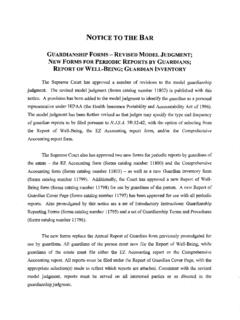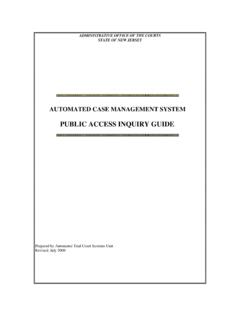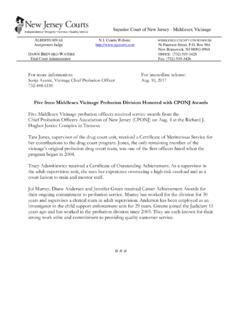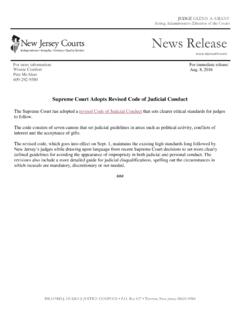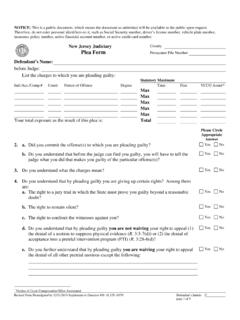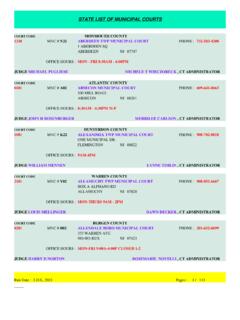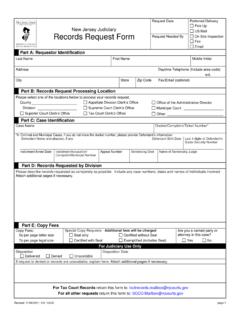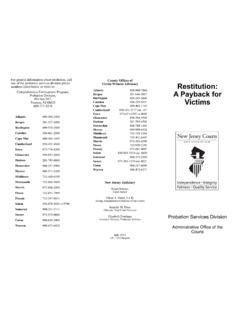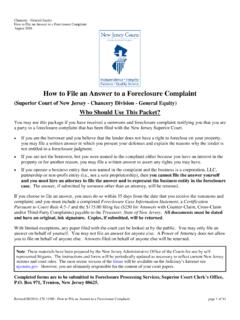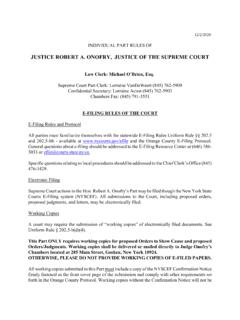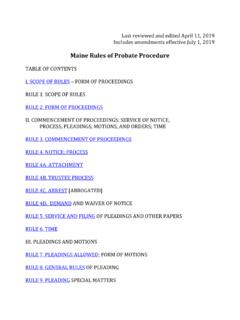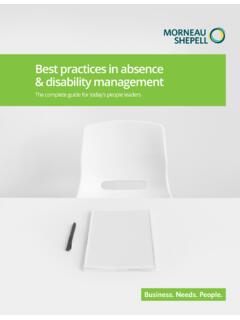Transcription of 1:6-2. Form of Motion; Hearing
1 RULE 1:6. MOTIONS AND BRIEFS IN THE TRIAL COURTS. 1:6-1. Applicability of Rule Rule 1:6 shall apply to all trial courts, except the municipal courts and except as otherwise provided by R. 3:26-2(d) (motions for bail reductions), R. 5:5-4 (motions in civil family actions), and R. 6:3-3 (motions in the Special Civil Part). Note: Amended November 7, 1988 to be effective January 2, 1989; amended July 13, 1994 to be effective January 1, 1995; amended January 21, 1999 to be effective April 5, 1999. 1:6-2. Form of Motion; Hearing (a) Generally. An application to the court for an order shall be by motion, or in special cases, by order to show cause. A motion, other than one made during a trial or Hearing , shall be by notice of motion in writing unless the court permits it to be made orally.
2 Every motion shall state the time and place when it is to be presented to the court, the grounds upon which it is made and the nature of the relief sought, and, as to motions filed in the Law Division-Civil Part only, the discovery end date or a statement that no such date has been assigned. The motion shall be accompanied by a proposed form of order in accordance with R. 3:1-4(a) or R. 4:42-1(e), as applicable. The form of order shall note whether the motion was opposed or unopposed. If the motion or response thereto relies on facts not of record or not subject of judicial notice, it shall be supported by affidavit made in compliance with R. 1:6-6. The motion shall be deemed uncontested and there shall be no right to argue orally in opposition unless responsive papers are timely filed and served stating with particularity the basis of the opposition to the relief sought.
3 If the motion is withdrawn or the matter settled, counsel shall forthwith inform the court. (b) Civil Motions in Chancery Division and Specially Assigned Cases; Affidavit of Non-Involvement in Medical Malpractice Actions. (1) Generally. When a civil action has been specially assigned to an individual judge for case management and disposition of all pretrial and trial proceedings and in all cases pending in the Superior Court, Chancery Division, the judge, on receipt of motion papers, shall determine the mode and scheduling of the disposition of the motion. Except as provided in R. 5:5-4, motions filed in causes pending in the Superior Court, Chancery Division, Family Part, shall be governed by this paragraph.
4 (2) Motion for Dismissal Pursuant to 2A:53A-40. A party moving for dismissal of the action on the ground of non-involvement in the cause of action pursuant to 2A:53A-40 of the New Jersey Medical Care Access and Responsibility and Patients First Act, 2A:53A-37 to 42, shall annex to the notice of motion an affidavit of non-involvement that complies with Rule 1:6-6. In the absence of opposition filed in accordance with Rule 1:6-3, the court shall enter an order dismissing the action as to the moving party . If opposition is filed, the court shall proceed in accordance with this rule. (c) Civil and Family Part Discovery and Calendar Motions. Every motion in a civil case or a case in the Chancery Division, Family Part, not governed by paragraph (b), involving any aspect of pretrial discovery or the calendar, shall be listed for disposition only if accompanied by a certification stating that the attorney for the moving party has either (1) personally conferred orally or has made a specifically described good faith attempt to confer orally with the attorney for the opposing party in order to resolve the issues raised by the motion by agreement or consent order and that such effort at resolution has been unsuccessful, or (2)
5 Advised the attorney for the opposing party by letter, after the default has occurred, that continued non-compliance with a discovery obligation will result in an appropriate motion being made without further attempt to resolve the matter. A motion to extend the time for discovery shall have annexed thereto either a copy of all prior orders granting or denying an extension of the discovery period or a certification that there have been no such prior orders. The moving papers shall also set forth the date of any scheduled pretrial conference, arbitration proceeding scheduled pursuant to R. 4:21A, calendar call or trial, or state that no such dates have been fixed. Discovery and calendar motions shall be disposed of on the papers unless, on at least two days' notice, the court specifically directs oral argument on its own motion or, in its discretion, on a party 's request.
6 A movant's request for oral argument shall be made either in the moving papers or reply; a respondent's request for oral argument shall be made in the answering papers. (d) Civil and Family Part Motions - Oral Argument. Except as otherwise provided by R. 5:5-4 (family actions), no motion shall be listed for oral argument unless a party requests oral argument in the moving papers or in timely-filed answering or reply papers, or unless the court directs. A party requesting oral argument may, however, condition the request on the motion being contested. If the motion involves pretrial discovery or is directly addressed to the calendar, the request shall be considered only if accompanied by a statement of reasons and shall be deemed denied unless the court otherwise advises counsel prior to the return day.
7 As to all other motions, the request shall be granted as of right. (e) Oral Argument - Mode. The court in civil matters, on its own motion or on a party 's request, may direct argument of any motion by telephone conference without court appearance. A verbatim record shall be made of all such telephone arguments and the rulings thereon. (f) Order; Record Notation. If the court has made findings of fact and conclusions of law explaining its disposition of the motion, the order shall indicate whether the findings and conclusions were written or oral and the date on which they were rendered. However, if the motion was argued and the court intends to place its findings on the record at a later date, it shall give all parties one day's notice, which may be telephonic, of the time and place it shall do so.
8 If no such findings have been made, the court shall append to the order a statement of reasons for its disposition if it concludes that explanation is either necessary or appropriate. If the order directs a plenary or other evidential Hearing , it shall specifically describe the issues to be so tried. A written order or record notation shall be entered by the court memorializing the disposition made on a telephone motion. Note: Source 3:11-2, 4:8-5(a) (second sentence). Amended July 14, 1972 to be effective September 5, 1972; amended November 27, 1974 to be effective April 1, 1975; amended July 24, 1978 to be effective September 11, 1978; former rule amended and redesignated as paragraph (a) and paragraphs (b), (c), (d), and (e) adopted July 16, 1981 to be effective September 14, 1981; paragraph (c) amended July 15, 1982 to be effective September 13, 1982; paragraph (c) amended July 22, 1983 to be effective September 12, 1983; paragraph (b) amended December 20, 1983 to be effective December 31, 1983.
9 Paragraphs (a) and (c) amended and paragraph (f) adopted November 1, 1985 to be effective January 2, 1986; paragraph (a) amended November 7, 1988 to be effective January 2, 1989; paragraph (c) amended and paragraph (d) caption and text amended June 29, 1990 to be effective September 4, 1990; paragraph (d) amended July 14, 1992 to be effective September 1, 1992; paragraph (c) amended July 13, 1994 to be effective September 1, 1994; paragraph (a) amended July 13, 1994 to be effective January 1, 1995;. paragraphs (a) and (f) amended January 21, 1999 to be effective April 5, 1999; paragraphs (c) and (d). amended July 5, 2000 to be effective September 5, 2000; paragraph (a) amended July 28, 2004 to be effective September 1, 2004; paragraphs (b), (c), and (f) amended July 27, 2006 to be effective September 1, 2006; paragraph (b) caption amended, former text of paragraph (b) captioned and redesignated as paragraph (1), and new paragraph (2) adopted July 9, 2008 to be effective September 1, 2008; paragraph (c) amended July 23, 2010 to be effective September 1, 2010; paragraph (a) amended July 9, 2013 to be effective September 1, 2013.
10 1:6-3. Filing and Service of Motions and Cross-Motions (a) Motions Generally. Other than an ex parte motion and except as otherwise provided by R. 4:6-2(e) (dismissal for failure to state a claim), R. 4:46-1 (summary judgment) and R. 5:5-4(c) (post judgment motions), a notice of motion shall be filed and served not later than 16 days before the specified return date unless otherwise provided by court order, which may be applied for ex parte. Thus, for example, if the return date of the motion is a Friday, the motion must be filed and served not later than the Wednesday, 16 days prior. If a motion is supported by affidavit or certification, the affidavit or certification shall be filed and served with the motion.
